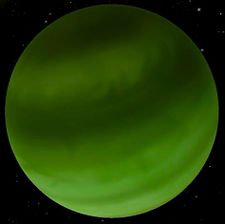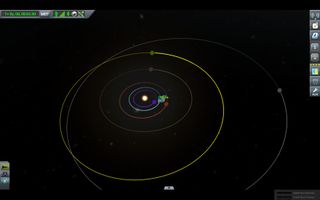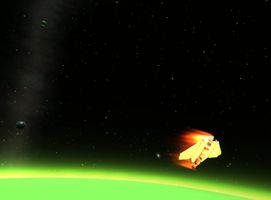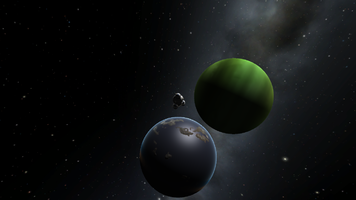Difference between revisions of "Tutorial:How to get to Jool"
m (- Resized Image) |
m (- Moved Image Position) |
||
| Line 36: | Line 36: | ||
===Step 5 - Arriving at Jool=== | ===Step 5 - Arriving at Jool=== | ||
| + | [[File:19Aerobrake.jpg|400x200px|thumbnail|right|A small probe aerobraking in Jool's dense atmosphere.]] | ||
When you get into Jool's SOI, you have two options for getting into orbit. | When you get into Jool's SOI, you have two options for getting into orbit. | ||
| Line 45: | Line 46: | ||
Option 1- | Option 1- | ||
When you arrive into Jool's SOI, make sure your periapsis is is above 200km. Simply point and burn retrograde at periapsis until you get into a stable orbit. | When you arrive into Jool's SOI, make sure your periapsis is is above 200km. Simply point and burn retrograde at periapsis until you get into a stable orbit. | ||
| − | + | ||
Option 2- | Option 2- | ||
A few days before you arrive in Jool's SOI, play with a manouver node and get your periapsis under 200km, inside Jool's atmosphere. The height of the periapsis is totally up to you, but I recommend not to go under 160km. Once there, enter Jool's atmosphere pointing retrograde. Try to keep your ship as stable as possible and not flip around, or else you could burn up. Once you have exited the atmosphere, burn retrograde for a bit if you are not in a stable orbit. A safer alternative to option two is to [[aerobrake]] in Lathe's atmosphere and then transfer to an orbit around Jool.This does require more planning, and I will not explain how to do it. | A few days before you arrive in Jool's SOI, play with a manouver node and get your periapsis under 200km, inside Jool's atmosphere. The height of the periapsis is totally up to you, but I recommend not to go under 160km. Once there, enter Jool's atmosphere pointing retrograde. Try to keep your ship as stable as possible and not flip around, or else you could burn up. Once you have exited the atmosphere, burn retrograde for a bit if you are not in a stable orbit. A safer alternative to option two is to [[aerobrake]] in Lathe's atmosphere and then transfer to an orbit around Jool.This does require more planning, and I will not explain how to do it. | ||
| Line 52: | Line 53: | ||
[[File:JoolLaythe.png|400x200px|thumbnail|right|A view of Jool and Laythe from orbit.]] | [[File:JoolLaythe.png|400x200px|thumbnail|right|A view of Jool and Laythe from orbit.]] | ||
| + | |||
===Step 5.5 - Some Things to do After Reaching Orbit=== | ===Step 5.5 - Some Things to do After Reaching Orbit=== | ||
Since it is not possible to land on Jool, here are some tasks that you could do in orbit. | Since it is not possible to land on Jool, here are some tasks that you could do in orbit. | ||
Revision as of 19:12, 19 October 2016
Contents
- 1 Introduction
- 2 Getting To Jool
- 3 Closing Word
Introduction
Jool is the second most distant body in the Kerbol system, and one of the more time-consuming locations to reach. Getting to Jool is really the next step after Eve, Duna, and Dres, and is an attractive target due to its large atmosphere and complex moon system.
Specifications
- Length: 1–3 hours
- Difficulty: Moderate/Hard
- For version: 1.0 to 1.2
Additionally, you will need a good understanding of orbital mechanics (see Tutorials section), angles, possibly aerobraking and a lot of patience.
Getting To Jool
Step 1 - Build Your Rocket
This rocket should be fully capable to reach Jool. To build this rocket, you will need at least 8,300 Delta-V. To save some Delta-V in your rocket, you could aerobrake around Jool or Lathe. Ideally, in Career mode, you should have a fully upgraded level 6 Technology tree to build this rocket. You could probably get away with a level 5 Technology tree but you will probably need to add more stages or more power to the bottom stage to make this design work.
Upper Stage
This stage should have enough fuel to get into Jool orbit and to possibly travel around Jool's 5 moons. You can reduce the required fuel by aerobraking inside Jool's atmosphere. At a bare minimum, use a Rocketmax Jumbo-64 Fuel Tank and ether a RE-L10 "Poodle" Liquid Fuel Engine or a LV-N "Nerv" Atomic Rocket Motor on the end.
Middle Stage
The middle stage should be able to escape Kerbin's SOI and get an encounter with Jool. A Rocketmax Jumbo-64 Fuel Tank will do for most small rockets but it depends on the size of your upper stage.
Lower Stage
This is the launcher stage that will get the rocket into orbit. Make sure you use a lot of Solid rocket booster and powerful engines. The size of your lower stage greatly depends on the size and mass of the middle and upper stages.
Step 2 - Planetary Alignment
While not absolutely essential, the easiest and fastest way to reach Jool from Kerbin is ensuring that they are properly aligned. Otherwise, you may spend a lot of time (possibly years) and fuel drifting until they happen to match up. To do so, check your map and make sure that Jool is in front of Kerbin in its orbit around Kerbol, and if you were to draw a line from Jool to Kerbol to Kerbin, it would form a ~90 degree angle.
Alternatively, you can visit The Interplanetary Guide and Calculator to calculate your own path.
Step 3 - Launching into Kerbin Orbit
Start with a normal launch from Kerbin by making a gravity turn at ~10km (or whatever you are familiar with). Get your apoapsis to ~70 to ~100km than make your orbital insertion. If you have extra fuel in your lower stage after your orbital insertion, make sure to save it for your interplanetary transfer.
Step 4 - Fly from Kerbin to Jool
Once you are in orbit, and Kerbin and Jool are aligned properly, select Jool as your target, it makes things a lot easier. Next, make a manouver node about 45 degrees past sunset. Then, pull out your prograde vector until the dotted yellow line leaves the Kerbin system and crosses Jool's orbit. If you have done these steps correctly, you should see two white arrows near each other, one pointing up and one pointing down. If you do not see these arrows, you might have to tweak your orbit a bit. Play with the prograde and retrograde vectors a bit until you see the arrows. If you get the two white arrows close enough to each other, you will get an encounter with Jool. If you cannot get an encounter, try moving your manouver node around a little bit. Once you complete the burn, you will be on a course to Jool!
Step 5 - Arriving at Jool
When you get into Jool's SOI, you have two options for getting into orbit.
1- Play it save and burn retrograde periapsis, but risk running out of fuel
2- Aerobrake, save some fuel but risk burning up in the atmosphere
Option 1-
When you arrive into Jool's SOI, make sure your periapsis is is above 200km. Simply point and burn retrograde at periapsis until you get into a stable orbit.
Option 2- A few days before you arrive in Jool's SOI, play with a manouver node and get your periapsis under 200km, inside Jool's atmosphere. The height of the periapsis is totally up to you, but I recommend not to go under 160km. Once there, enter Jool's atmosphere pointing retrograde. Try to keep your ship as stable as possible and not flip around, or else you could burn up. Once you have exited the atmosphere, burn retrograde for a bit if you are not in a stable orbit. A safer alternative to option two is to aerobrake in Lathe's atmosphere and then transfer to an orbit around Jool.This does require more planning, and I will not explain how to do it.
Congratulations! You have now reached Jool!
Step 5.5 - Some Things to do After Reaching Orbit
Since it is not possible to land on Jool, here are some tasks that you could do in orbit.
- Gather science in orbit
- Bring probes and explore Jool's five moons: Laythe, Vall, Tylo, Bop and Pol
- Try landing your ship one one of the moons
- Gather science from Jool's mysterious atmosphere
Step 6 - Returning Home
First, select Kerbin as your target. Next, Wait until Kerbin is about 50 degrees behind Jool. Set up a manouver node at about 45 degrees past sunrise. Then, pull out your prograde vector until the dotted yellow line leaves the Joolian system and crosses Kerbin's orbit. If you have done these steps correctly, you should see two white arrows near each other, one pointing up and one pointing down. If you do not see these arrows, you might have to tweak your orbit a bit. Play with the prograde and retrograde vectors a bit until you see the arrows. If you get the two white arrows close enough to each other, you will get an encounter with Kerbin. If you cannot get an encounter, try moving your manouver node around a little bit. Once you complete the burn, you will be on a course back to Kerbin.
From here, ether burn retrograde at periapsis or aerobrake using Kerbin's atmosphere.
Other Ways to Reach Jool
Another way to reach Jool is to preform a Gravity Assist around Eve. (You can find that here: Tutorial: Gravity Assist)
Closing Word
You have now successfully done a mission to the Jool! Your next mission is to now go to Eeloo, the farthest planet in the Kerbol system. Or, you could also go to Moho, the one closest to the sun. It's your choice! I thank you for using this tutorial and wish you good luck on your journey through the Kerbol system. Bye!



